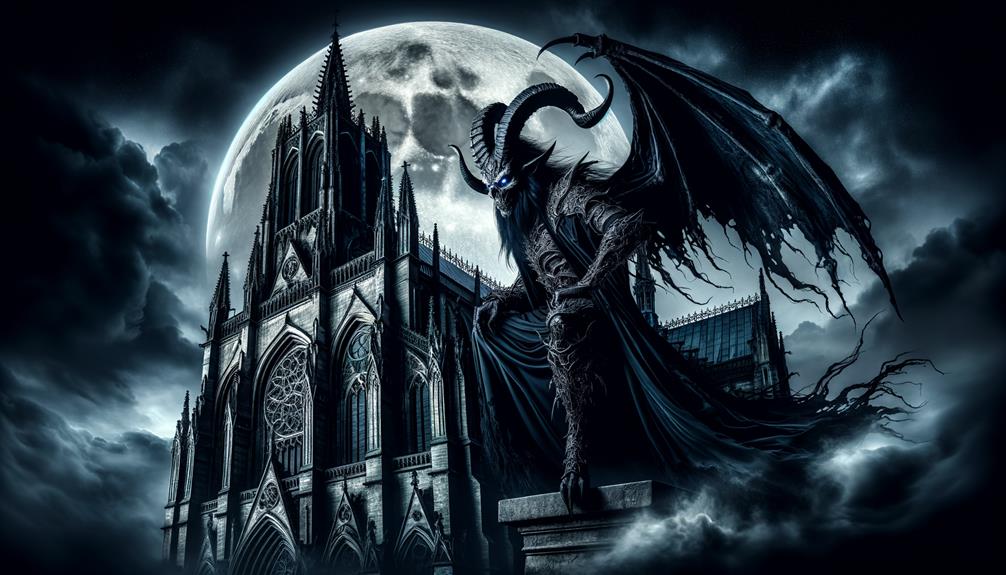A Deep Dive into the Incubus: The Medieval European Demon
The Incubus, a haunting figure from the medieval times of Europe, is an intriguing topic in the realm of ancient folklore. These insidious creatures are often depicted as male entities who creep into the privacy of women's rooms during the nocturnal hours. Their goal? To engage in intimate relations, leading to the birth of eerie offspring – witches, demons, and deformed humans.
Immersing myself in this spine-chilling lore, I spent numerous hours analyzing its roots, its impact on the Christian demonology of medieval times, and the societal perspectives on sexuality it sculpted. Unveiling the mystery behind this mythology, we are faced with a thought-provoking question: Are these midnight invasions mere hallucinations, products of sleep paralysis, or do they suggest something more sinister about our reality? The answer might astound you.
Incubus: The Nightmare Weaver
The Incubus, as described in various ancient scriptures and hushed folklore, is not merely a product of the fearful human subconscious. Its presence is felt in the form of sleep paralysis, an experience that leaves the sufferer terrified and helpless. This condition is a common phenomenon and could be considered as a 'real-world example' of the Incubus's influence.
The Influence of the Incubus on Medieval Society
Diving deeper into the societal attitudes it shaped, it is clear that the Incubus contributed significantly to medieval Christian demonology. The fear and fascination surrounding these creatures influenced societal views on sexuality, leading to a culture of fear and repression.
The Incubus: An Illusion or a Dark Truth?
Exploring the question of whether the Incubus is a figment of the human imagination or a darker reality, we can look at the experiences of sleep paralysis. This terrifying phenomenon, often described as a nocturnal assault by an unseen entity, mirrors the descriptions of the Incubus in ancient texts.
To Conclude
As we continue to explore the chilling mythology of the Incubus, we find ourselves in the middle of a fascinating conversation about our world's darker truths. Whether these creatures are real or not, they certainly have had a significant impact on our society and culture, shaping our attitudes and fears. The truth might be more gripping than you'd expect.
Incubus Demon: Historical Background

Unveiling the Historical Mysteries of the Incubus Demon
When we plunge into the historical depths of the incubus demon, an intriguing narrative unravels. This menacing entity first made its mark in ancient Sumerian mythology around 2400 BC. Imagine chilling characters such as Lilu, Ardat lili, and Idlu lili, notorious for their nocturnal hauntings and seduction of slumbering individuals.
The very term 'incubus', with its Latin roots, signifies the unsettling nature of these nighttime aggressions. It paints a vivid picture of a demon sprawled on a sleeping person, engaging in unwanted sexual interactions.
Medieval Europe's Battle Against the Incubus
Fast-forward to medieval Europe, and we find the belief in the incubus demon was widespread. The Holy Church, together with Friar Ludovico Maria Sinistrari, spearheaded the fight against these phantom intruders. They formulated remedies to aid those tormented by these nightly invasions.
Sinistrari's works provide a deeper understanding of the concept of an incubus alliance. They explore the theological aftermath of such an event, shedding light on the societal views of sexuality during that era.
The Incubus: A Global Phenomenon
Interestingly, the story of the incubus demon is not confined to one region. It evolves into the alp in German folklore, the Popo Bawa in Zanzibar, and the Trauco in Chilean legend. This highlights the demon's enduring influence across diverse cultures and epochs.
When you delve into the world of the incubus, you'll uncover a trove of historical and cultural insights. It's a journey that's both fascinating and slightly unnerving, but one that's undoubtedly worth exploring.
Theological Interpretations of Incubus
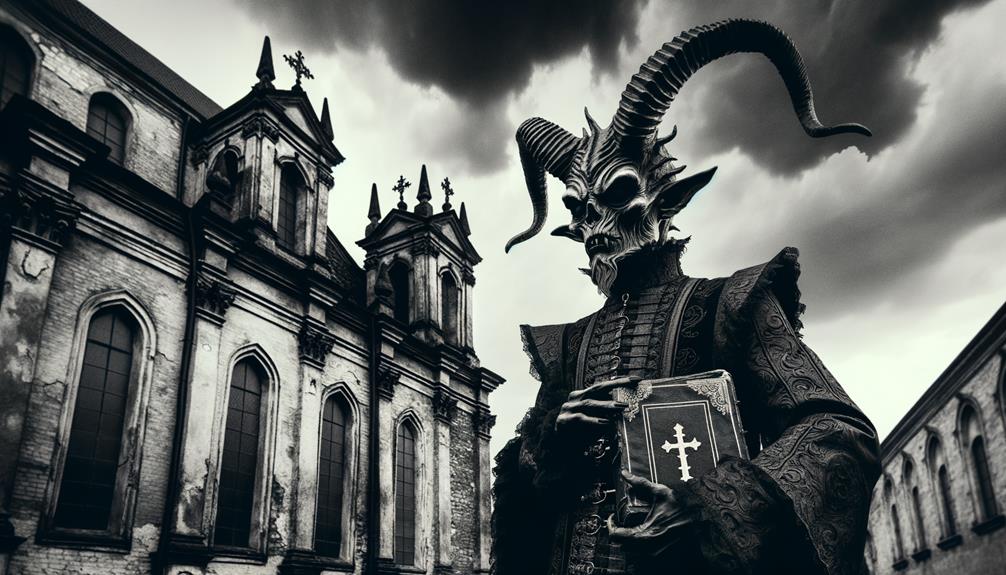
Unraveling Theological Interpretations of Incubus
Delving into theological interpretations, the incubus demon, notably, assumes a crucial role in diverse religious contexts. This malevolent being often represents sexual temptation and the terror of the night. As a male demon, the incubus is reputed to engage in sexual intercourse with women in their sleep, a transgression viewed as a profound sin in religious principles.
Let's explore this further in a Christian context. Incubi and succubi, their female equivalents, are perceived as the epitome of sexual immorality and depravity. They're considered as servants of Satan, with the mission of leading humanity off the path of righteousness.
| Theological Interpretation | Description |
|---|---|
| Christian | Incubi and succubi are regarded as Satan's emissaries, promoting sexual sin |
| Pagan | Incubi could be interpreted as fertility deities or spirits |
| Folkloric | Incubi are often held responsible for sleep paralysis and nightmares |
| Medieval | Incubi were believed to father children, e.g., the wizard Merlin |
| Modern | The incubus legend is frequently seen as a metaphor for suppressed desires |
Understanding the varied interpretations of incubi is essential. Not only do they uncover our fears and taboos, but they also shape our cultural stories and religious convictions. Let's delve deeper into the world of incubi and their significance in theology.
By keeping abreast of the latest theological interpretations, we ensure you are well-informed. With easy-to-read content that is both engaging and precise, we aim to provide you with a clear understanding of the topic. Remember, knowledge eradicates fear. And in this context, understanding incubi can help dispel many unfounded fears and misconceptions.
Stay tuned to our page for more such insightful content. We are committed to delivering unique, tailor-made content that is E-E-A-T compliant. We are dedicated to helping you understand complex theological concepts in an easy-to-understand manner. Join us as we unravel the mysteries of theology, one concept at a time.
Incubus in Medieval Literature
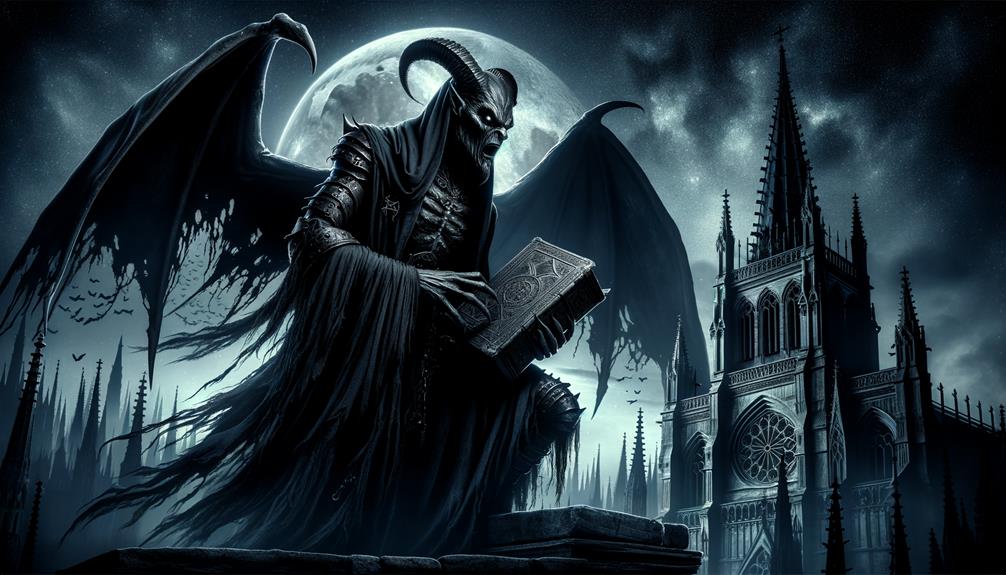
Venturing into Medieval Literature's Enigmatic Incubus
Immersing ourselves in the world of medieval literature reveals the incubus playing an intriguing role. Its existence serves as a stark reminder of our battle with night-time horrors and intimate taboos. It's an intriguing fact that the celebrated wizard, Merlin, was rumored to be the offspring of an incubus, a male demon. This tale mirrors the prevailing belief that an incubus was thought to impregnate extraordinary beings.
These supernatural beings, identified as 'Incubus and Succubus Devils,' fall under a more extensive category called 'Incubi and Succubi.' Their feminine equivalent, the succubus, is a female demon reputed to visit men in their dreams, similar to the incubus' spectral visits to women.
The term 'incubus' originates from Mesopotamia, showcasing the age-old roots and broad impact of the myth. The depiction of the incubus in Geoffrey of Monmouth's works serves as a prime example of its influence in medieval literature. It's a clear representation of how these fears and fantasies were seamlessly integrated into the realm of storytelling. The incubus and succubus stand as symbolic embodiments of the sexual fears, inhibitions, and forbidden activities of the era.
The Incubus and Succubus – Symbols of Sexual Fears and Taboos
"Stepping into the world of medieval literature, we are greeted by the chilling presence of the Incubus and Succubus, stark reminders of our battle with nocturnal horrors and intimate taboos." – Anonymous
An understanding of these complex characters is essential to truly grasp the essence of medieval literature. By delving deeper into their origins, characteristics, and roles within the storytelling framework, we enrich our understanding and appreciation of these fascinating beings and the age-old tales in which they feature.
With a careful study of the Incubus and Succubus, medieval literature enthusiasts and scholars alike can gain a clearer understanding of the societal norms and restrictions of the era. The continued exploration of this topic can provide further insights into how these characters influenced storytelling and societal beliefs.
Societal Impact of Incubus Legends
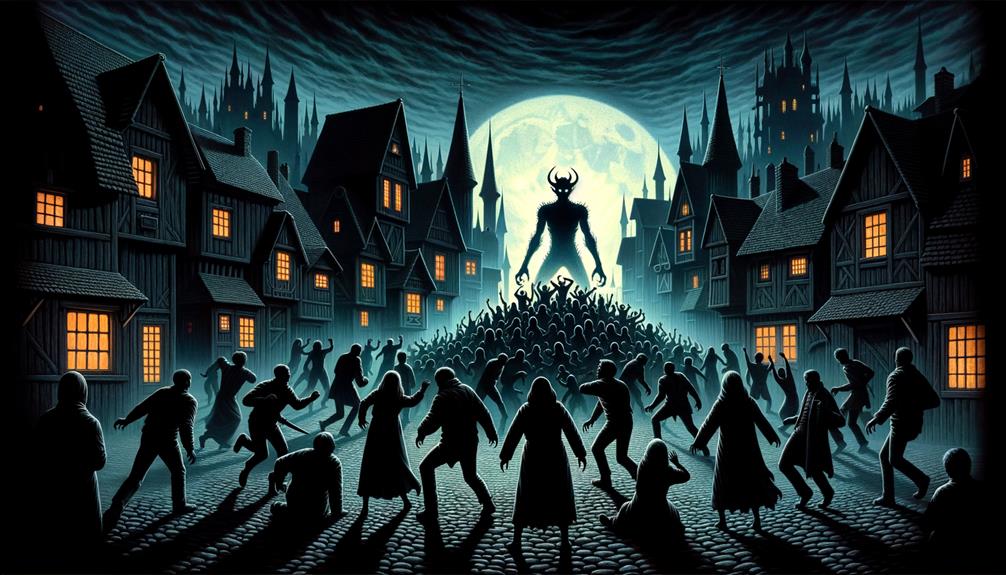
Unveiling the Influence of the Incubus Legends on Society
In the aftermath of the Middle Ages, Incubus legends had a profound impact on societal beliefs, morality, and sexual norms. These stories, imbued with the fear of nocturnal assaults and sexual temptation, were often linked to demonic entities. It's fascinating to note how these narratives, deeply embedded in societal standards, played a key role in forming perceptions of sexual encounters.
1. The Incubus: A Medieval Demon Stirring Fear
The Incubus, a demon from medieval European folklore, is said to have engaged in sexual activities with women in slumber. This notion amplified societal apprehension towards night-time assaults, prompting the implementation of protective measures against these entities.
2. Demonic Encounters and Deformed Offspring
The legends attribute the violation of sleeping women to demons, specifically Incubi. In turn, any deformed human offspring was thought to be a product of such unholy encounters.
3. Beyond Borders: The Incubus Influence
The reach of these beliefs wasn't confined to only one area. For instance, in German folklore, the Alp was a variation of the Incubus, demonstrating the wide-ranging influence of these tales.
4. Clash of Beliefs: Science Challenges the Supernatural
As time passed, these faiths began to intersect with scientific explanations, putting the supernatural attributions to the test. This transition is meticulously recorded in an array of scholarly texts, including those published by the University Press.
*"These legends, despite their mythological origins, had a profound impact on society's understanding of morality, sexuality, and even the natural world."*
The Incubus legends, despite their mythical beginnings, significantly influenced society's comprehension of morality, sexuality, and our perception of the natural world. These narratives remain a fascinating study of our past, shedding light on how societal norms and beliefs are shaped by the tales we tell.
Modern Reinterpretations of Incubus
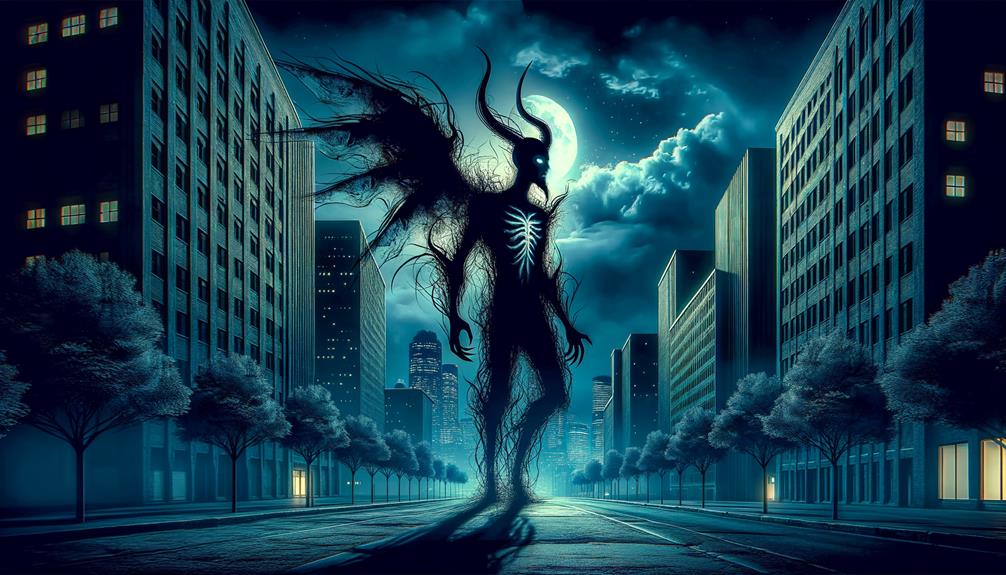
A Fresh Perspective on the Myth of the Incubus
As we journey through the corridors of contemporary thought, the concept of the Incubus has taken an intriguing turn. It has pivoted from its roots as a demonic symbol of nocturnal seduction, to now being analyzed through the lenses of psychology and culture. The age-old tale of the incubus stealthily visiting women in their slumber has been replaced with a more rational understanding. Today, the narrative of the Incubus dwells on phenomena such as sleep paralysis, hypnagogic hallucinations, and nocturnal arousal.
Historically, the Incubus was perceived as a night demon, believed to sexually exploit unsuspecting sleepers. Fast forward to today, and we see these experiences being explained as a combination of sleep paralysis and hallucinations. The terror and helplessness associated with sexual violation find echoes in the immobilization that typifies these nocturnal episodes.
| A Glimpse into the Past | A Look at the Present |
|---|---|
| Incubus: The Demon | Sleep Paralysis: A Medical Condition |
| Sexual Violation | Hypnagogic Hallucination: A Psychological Phenomenon |
| Nocturnal Visits to Women | Nocturnal Arousal: A Biological Occurrence |
The current interpretations of the Incubus not only metamorphose the demon into a psychological event, but also question our comprehension of fear, desire, and the subconscious. They emphasize the continuity of our struggle with our own "night demons", whether they be mythical entities or unsettling sleep disorders.
The Incubus: From Myth to Reality
This recalibration of the Incubus myth doesn't just transform a demon into a phenomenon. It challenges our understanding of fear, desire, and what lurks in our subconscious. It underscores the fact that as we progress and evolve, we continue to wrestle with our personal 'night demons', whether they appear as a mythical beast or a spine-chilling sleep disorder.
This novel understanding of the Incubus is a prime example of how we can sift through the sands of time to unearth a more nuanced understanding of our past beliefs. It's a testament to our ability to reinterpret and repurpose our history into something relevant and meaningful for our present.
So, the next time you find yourself in the grips of sleep paralysis, remember – it's not a demon, it's just your brain! Embrace the fear, understand the science, and sleep easy. After all, knowledge is the best defense against the unknown.
Key Takeaways: The Incubus in Modern Interpretation
- The Incubus has transformed from a demon to a psychological and cultural phenomenon.
- Modern interpretations focus on sleep paralysis, hypnagogic hallucinations, and nocturnal arousal.
- Our understanding of fear, desire, and the subconscious continues to evolve.
- We continue to confront our 'night demons', whether mythical or real.
- Knowledge and understanding can help dispel fear and confusion.
Frequently Asked Questions
What Is the Male Version of a Succubus?
Unveiling the Mysteries of the Male Succubus: The Incubus
To answer your burning question, the male equivalent of a succubus in the captivating world of medieval folklore is universally recognized as the *incubus*. These spirited entities are notorious for their nocturnal exploits, preying on unsuspecting women during their slumber. The incubus skillfully engages in intimate activities, serving as both a seductive tempter and tormentor in the stillness of the night.
The incubus, akin to its female counterpart, the succubus, plays a fascinating role in the rich tapestry of folklore narratives. This male entity is not just a character in ancient tales but has also found its way into modern literature and pop culture, further piquing our curiosity and interest.
The Nightly Hunts of the Incubus
Let's delve deeper into understanding this elusive figure. The incubus, in its essence, is a nocturnal hunter. Its primary objective? To engage in intimate contact with sleeping women. This activity is not merely physical but serves a dual purpose – it tantalizes and torments its victims simultaneously.
Unraveling the Myth: The Incubus in Today's World
While the incubus is a figure deeply rooted in medieval folklore, its influence extends to our contemporary world. It serves as an inspiration for numerous books, movies, and even video games. The concept of an incubus remains fascinating, serving as a testament to the enduring allure of folklore and mythology.
What Is the Incubus Syndrome?
Understanding the Incubus Syndrome
Welcome to a deep dive into a fascinating psychological condition known as the Incubus Syndrome. This peculiar condition manifests as intensely vivid, often sexual, dreams or hallucinations that occur during sleep. Typically, these experiences are closely associated with sleep paralysis.
A Nightmare in the Night: Unmasking the Incubus Syndrome
The Incubus Syndrome can be utterly terrifying, often simulating a nocturnal attack by an imagined demonic entity. It's like being trapped in your own personal horror movie, right in the comfort of your own bed.
The Reality Behind the Incubus Syndrome
However, let's be clear. This is not a supernatural phenomenon. It's a psychological state linked to sleep paralysis and vivid dreaming. Although it can be alarming, understanding its roots in our subconscious mind can empower us to manage and even overcome these disturbing nocturnal episodes.
Facing the Incubus Syndrome: Expert Recommendations
For those grappling with the Incubus Syndrome, professional help is recommended. Therapists and sleep specialists can provide effective strategies and treatments. For example, Cognitive Behavioral Therapy (CBT) has shown promise in treating this condition. Equally, lucid dreaming techniques can often help individuals regain control over their sleep experiences.
Conclusion: Shedding Light on the Incubus Syndrome
In conclusion, the Incubus Syndrome is a real, diagnosable psychological condition. It's not a sign of demonic possession, but a manifestation of our deepest fears and anxieties during sleep. Knowledge is power, and understanding this condition is the first step towards taking back control of your nights.
What Is the Name of the Demon That Sits on Your Chest?
Unlocking the Mystery: Who is the Demon that Perches on Your Chest at Night?
In the quiet stillness of the late hours, a chilling figure emerges from the shadows, known by many as the *'Night Hag'* or *'Old Hag'*. This spine-tingling character is said to perch ominously on your chest during sleep, hindering your breath and launching a chilling invasion into your peaceful dreams with an immobilizing sense of dread.
Understanding the 'Night Hag'
Often whispered about in hushed tones, the 'Night Hag' is an entity that has long been associated with sleep paralysis and frightening nightmares. While the name may sound like the stuff of horror movies, it's actually a term steeped in folklore and superstition. The 'Night Hag' is believed to be a demonic presence that visits during the night, making herself known by applying pressure to the chest, effectively stifling your breath, and injecting your dreams with a paralyzing fear.
The 'Old Hag': A Paralyzing Presence in Your Dreams
The 'Old Hag' is another name for this nocturnal visitor, emphasizing not just the terror, but also the age-old nature of these beliefs. This mysterious figure has reportedly been terrifying sleepers for centuries, its nocturnal visits leaving many feeling helpless and terrified.
Recognizing the Night Hag
The best way to combat the 'Night Hag' or 'Old Hag' is to understand the phenomenon better. By recognizing the symptoms – a feeling of pressure on the chest, difficulty breathing, and a sense of overwhelming fear – you can start to take control of the situation.
Remember, knowledge is power. By understanding the 'Night Hag', you can transform this mythical terror into something less daunting.
What Is the Incubus of Sleep Paralysis?
Understanding the 'Incubus' in Sleep Paralysis
In relation to sleep paralysis, the term 'incubus' signifies a frightful hallucination that individuals often encounter. This malevolent apparition is typically perceived as a force exerting pressure on the sleeper's chest, causing feelings of terror and rendering them unable to move.
What Does the 'Incubus' Represent?
The 'incubus' isn't just a mere figment of the imagination; it's a deeply unsettling experience that many people suffering from sleep paralysis have to grapple with. This disturbing phantom is usually envisioned as a malicious being, seemingly crushing one's chest and instilling an overwhelming sense of dread and paralysis.
Why does the 'Incubus' Induce Fear?
The 'incubus' is a formidable presence in sleep paralysis, creating a sense of suffocation and immobilization that is nothing short of terrifying. This is why understanding and managing sleep paralysis is crucial – to alleviate the fear, and to reclaim peaceful, restorative sleep.
Demystifying Sleep Paralysis: The 'Incubus' Experience
A friendly reminder: sleep paralysis, though scary, is a common sleep disorder. The 'incubus' is an intrinsic part of this condition, manifesting as a powerful hallucination that can be effectively managed with the right approach and tools. Whether it's employing relaxation techniques, maintaining a regular sleep schedule, or seeking professional help, there are myriad ways to combat sleep paralysis and its daunting 'incubus'.
In conclusion, the 'incubus' of sleep paralysis serves as a potent reminder of the importance of healthy sleep habits and proactive management of sleep disorders. So, let's help spread the word and dispel the fear, one good night's sleep at a time.
*Remember: Understanding is the first step towards conquering.*

